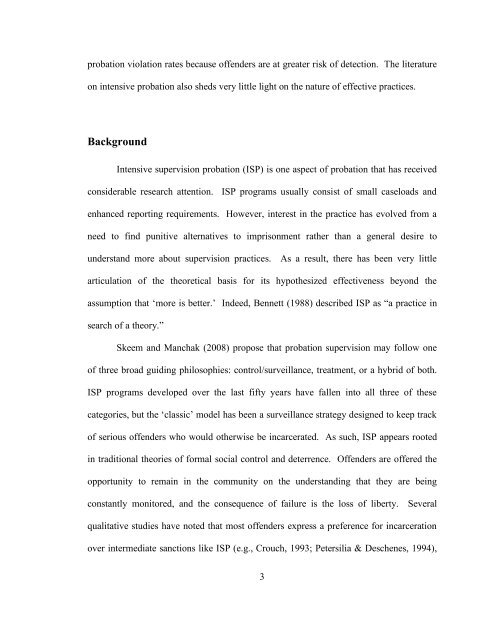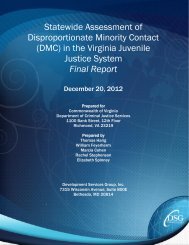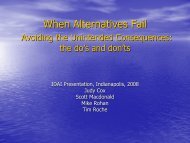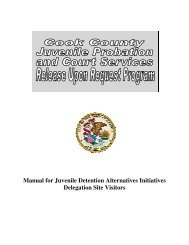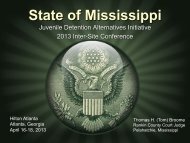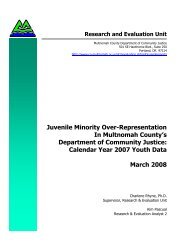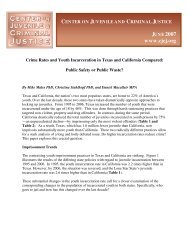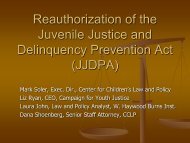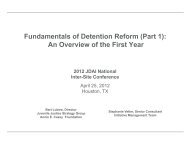The Effects of Sanction Intensity on Criminal Conduct - JDAI Helpdesk
The Effects of Sanction Intensity on Criminal Conduct - JDAI Helpdesk
The Effects of Sanction Intensity on Criminal Conduct - JDAI Helpdesk
Create successful ePaper yourself
Turn your PDF publications into a flip-book with our unique Google optimized e-Paper software.
probati<strong>on</strong> violati<strong>on</strong> rates because <str<strong>on</strong>g>of</str<strong>on</strong>g>fenders are at greater risk <str<strong>on</strong>g>of</str<strong>on</strong>g> detecti<strong>on</strong>. <str<strong>on</strong>g>The</str<strong>on</strong>g> literature<br />
<strong>on</strong> intensive probati<strong>on</strong> also sheds very little light <strong>on</strong> the nature <str<strong>on</strong>g>of</str<strong>on</strong>g> effective practices.<br />
Background<br />
Intensive supervisi<strong>on</strong> probati<strong>on</strong> (ISP) is <strong>on</strong>e aspect <str<strong>on</strong>g>of</str<strong>on</strong>g> probati<strong>on</strong> that has received<br />
c<strong>on</strong>siderable research attenti<strong>on</strong>. ISP programs usually c<strong>on</strong>sist <str<strong>on</strong>g>of</str<strong>on</strong>g> small caseloads and<br />
enhanced reporting requirements. However, interest in the practice has evolved from a<br />
need to find punitive alternatives to impris<strong>on</strong>ment rather than a general desire to<br />
understand more about supervisi<strong>on</strong> practices. As a result, there has been very little<br />
articulati<strong>on</strong> <str<strong>on</strong>g>of</str<strong>on</strong>g> the theoretical basis for its hypothesized effectiveness bey<strong>on</strong>d the<br />
assumpti<strong>on</strong> that ‘more is better.’ Indeed, Bennett (1988) described ISP as “a practice in<br />
search <str<strong>on</strong>g>of</str<strong>on</strong>g> a theory.”<br />
Skeem and Manchak (2008) propose that probati<strong>on</strong> supervisi<strong>on</strong> may follow <strong>on</strong>e<br />
<str<strong>on</strong>g>of</str<strong>on</strong>g> three broad guiding philosophies: c<strong>on</strong>trol/surveillance, treatment, or a hybrid <str<strong>on</strong>g>of</str<strong>on</strong>g> both.<br />
ISP programs developed over the last fifty years have fallen into all three <str<strong>on</strong>g>of</str<strong>on</strong>g> these<br />
categories, but the ‘classic’ model has been a surveillance strategy designed to keep track<br />
<str<strong>on</strong>g>of</str<strong>on</strong>g> serious <str<strong>on</strong>g>of</str<strong>on</strong>g>fenders who would otherwise be incarcerated. As such, ISP appears rooted<br />
in traditi<strong>on</strong>al theories <str<strong>on</strong>g>of</str<strong>on</strong>g> formal social c<strong>on</strong>trol and deterrence. Offenders are <str<strong>on</strong>g>of</str<strong>on</strong>g>fered the<br />
opportunity to remain in the community <strong>on</strong> the understanding that they are being<br />
c<strong>on</strong>stantly m<strong>on</strong>itored, and the c<strong>on</strong>sequence <str<strong>on</strong>g>of</str<strong>on</strong>g> failure is the loss <str<strong>on</strong>g>of</str<strong>on</strong>g> liberty. Several<br />
qualitative studies have noted that most <str<strong>on</strong>g>of</str<strong>on</strong>g>fenders express a preference for incarcerati<strong>on</strong><br />
over intermediate sancti<strong>on</strong>s like ISP (e.g., Crouch, 1993; Petersilia & Deschenes, 1994),<br />
3


